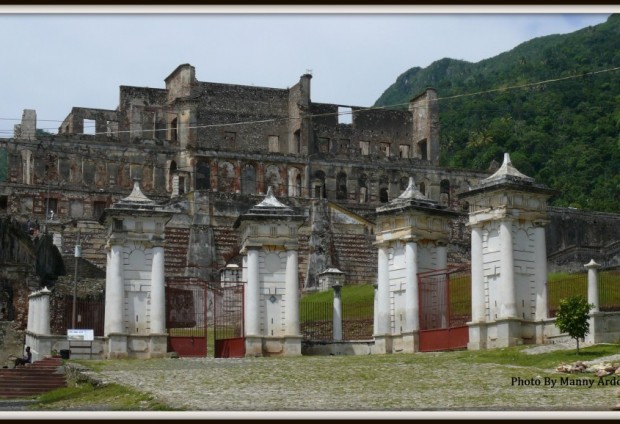Is Jean-Claude Duvalier Forgiveable?
© Max Zamor
maxzamor@comcast.net
Just mention the name Duvalier and you’ll get an earful of converging opinions from many, especially Haïtians who lived through the brutal period when father François and son Jean-Claude ruled Haïti in tandem with iron fists, for almost thirty years. They spread fear while being protected by a private militia known as the “Tonton Macoutes”. Thirty thousand Haïtians were ostensibly killed or disappeared, and countless more tortured, leaving the country with a deep gaping wound of mistrust, hatred and a nightmarish social deficit. When Jean-Claude “Baby Doc” Duvalier left the country to go into exile in France in 1986, the jubilant streets quickly erupted into a kind of vigilante justice never before seen. So, when he orchestrated a surprised return to Haïti last month, the same opinions surfaced and diverged, this time pitting those who long for the laissez faire days of the Duvalier’s regime against the ones who are nursing the wounds of dictatorship, still fresh in their mind. Many are mulling over the significance of his return and what it means for the future of the country.
Speculations abound as to the reasons for Mr. Duvalier’s return to Haïti; Why now? His resurgence to power is deemed unlikely and even if he tried to mount a comeback, the political dynamics are not favorable for such a scenario. Other actors have already staked their grounds and will protect the gains they have acquired since Duvalier left. In this case, only more bloodshed would result. The impact he may have is unknown at this time, despite still enjoying some waning support, especially among the destitute former military elite. Clearly, if Jean-Claude Duvalier gets involved in this political quagmire, the outcome for Haïti would not be a desirable one: The country is still reeling under a devastating earthquake that killed three hundred thousand people, a ravaging cholera outbreak and a moribund government seemingly more interested in holding on to power than improving the lives of its citizens.
Since Duvalier’s departure from the country, in February 1986, true to Haïti’s history, there has been a multitude of leaders who vied for Haïti’s gold: The chance to grab power in order to cash in from the bounty of millions of dollars in foreign aid pouring into the country, control the corruption machine and latch on to their closely protected monopolies of everything from toothpaste to motor oil. After all, with over eight million inhabitants, Haïti is the third largest consumer market in the Caribbean after Cuba and Dominican Republic. Each of these leaders squandered their opportunity to be the catalyst of change in a country known for its incredible resilience. For twenty five years, there has not been a stable government to guide the country toward a better future. Haïti has suffered through ineffective ephemeral governments, kleptomaniac leaders with questionable backgrounds; conditions that contributed to stunting its development. In addition, a series of hurricanes and other natural disasters added to setting back whatever progress Haïti has made under the current regime of President René Préval’s sometimes contentious five year rule.
On the heel of the disputed November 2010 elections that still remain inconclusive, peaceful continuity is more than ever before at a premium, yet so fragile, in a country that has known little stability, even in good times. The presence of Jean-Claude Duvalier in the country threatens to increase the fever pitched rhetoric for or against the return to the old dictatorship days. This is not the debate Haïti needs now. How to provide permanent homes for the millions of people still living under the tents; how to begin rebuilding and provide adequate basic services should be the primary discussions among every Haïtian, no matter what their political affiliation is.
The question on everyone’s mind remains: When will Haïti get out from under the grip of poverty? It is accepted and often repeated that the key to what ails Haïti will always be elusive without a Haïtian solution. For many, that means the inclusion of millions of their compatriots living abroad in the decisions affecting the country. During the Duvalier’s reign, as it is customary under many dictatorial governments, there has been a brain exodus to other countries by those who feared for their lives and their families’. That brain drain is more evident in Haïti than anywhere else, perhaps because the needs there are so great. Hence, all around the world you will find generations of highly educated and experienced Haïtians who would gladly lend their expertise and other assets to revitalize their country. When it comes to Haïti, human capital is not lacking. However, the constitution adopted in 1987 explicitly excluded those Haïtians from participating in the affairs of their country. In fact, the Haïtian Diaspora has long complained about that exclusion, having been born in the country, willing to contribute to its development and wishing for its survival as earnestly as any Haïtian.
Would the participation of the Haïtian Diaspora in the decisions of the country be enough to pull Haïti out of the abyss? Considering the nature of the deep seeded wound desolating the hearts of the Duvalier’s victims, Haïti’s recovery will need more than expertise and money: It needs for those wounds to be healed. The United States commemorate Pearl Harbor every year; however, Japan is arguably this country’s closest ally. Vietnam and the U. S. have reestablished diplomatic ties and business relationships between the two countries are flourishing. And who can forget the blowing up of the Pan Am airliner over Lockerbie, Scotland, which Mohamar Khadafi has recently taken responsibility for. Now Libya enjoys privileges reserved only for friendly States. Those conflicts and acts of war opened some deep wounds difficult to close. One mark of a great person or, for that matter, a great nation, is to be able to look into the enemy’s eyes and say: I forgive you.
This is not meant to lessen the importance of the atrocities the Duvaliers have been accused of. It is important for Jean-Claude Duvalier to face justice and answer to the crimes perpetrated during his regime. Besides, he must have known that there would be no safe haven for him in Haïti when he returns. Some are advocating his release into the streets and watch what happens to him. Such vigilante justice would only serve to reduce Haïtian society to nothing more than what the Duvaliers are accused of doing to their countrymen. The bar of justice must be raised higher. Already several complaints related to the crimes he allegedly committed have been filed against him, awaiting prosecution. That’s the first step toward healing, even if it’s through a Haïtian style broken justice system. Jean-Claude Duvalier must acknowledge that those crimes occurred and take full responsibility. But Haïtians must also be ready to collectively forgive in order to move forward. Forgiveness would bring meaning to the death of their loved ones. There is no better way to honor the memory of those who perished. South Africa was able to go through this healing process with their Truth and Reconciliation Commission. Haïti can do it also.
Famous Tonton Macoutes like Roger Lafontant, Ti Bobo, Cambronne, and others cannot be unearthed to benefit from that forgiveness. But doing so, even symbolically, would mean that Haïtians have moved past the revenge mentality and ended once and for all the cycle of tit for tat that prevented cooperation, promoted mistrust, and helped to keep the country from climbing out of its misery.
For those wounds to start to close, justice must prevail. It begins with every Haïtian being cognizant of the need for reconciliation to take place. To forgive is the right thing to do if healing, thus any meaningful and lasting rebuilding is to occur.
And without that healing, only God can help Haïti.



No comments yet.